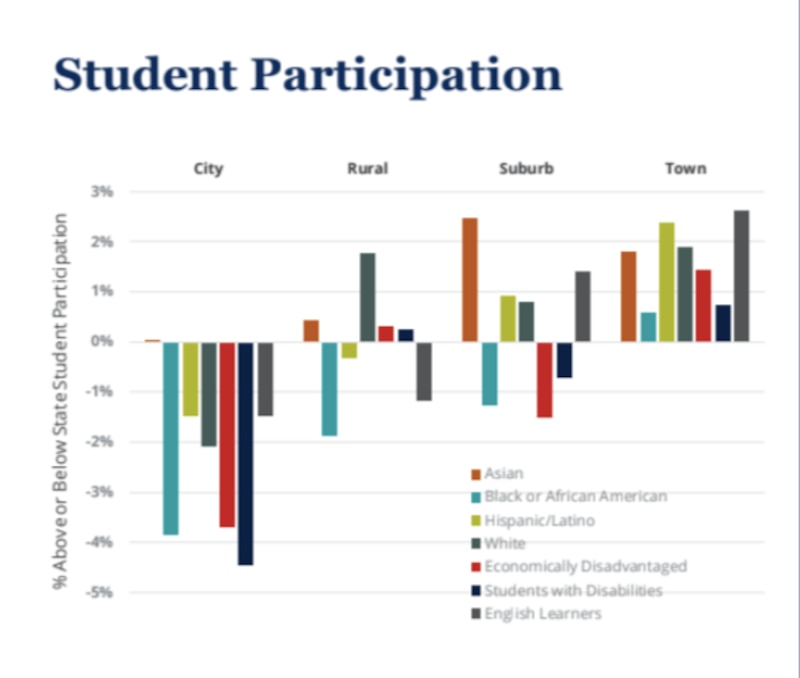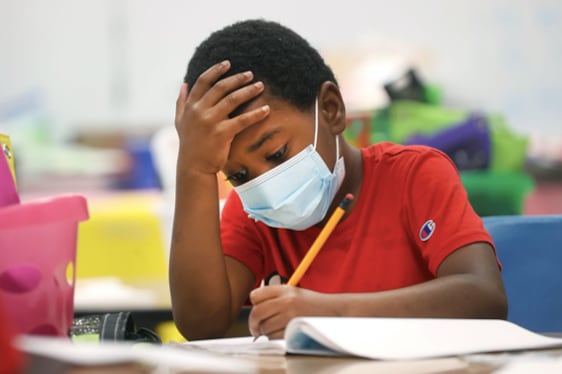Tennessee’s first pandemic test scores declined across all subjects and grades, with the sharpest drops among students who have trailed their peers historically and learned remotely the longest.
State-level results released Monday showed a decrease in proficiency of 5 percentage points since 2019, the last time that public school students in grades 3-11 took standardized tests under the Tennessee Comprehensive Assessment Program, also known as TCAP.
The dramatic slide for 2020-21 was expected due to COVID and follows national trends after one of the most disrupted periods of schooling in American history. The results will set Tennessee’s new baselines for improvement going forward.
In 2019 — the last time standardized testing occurred — Tennessee students improved in nearly every math subject, older students showed gains in English, and more than half the schools improved in most subjects. Testing was canceled nationwide in 2020.
Consistent with national data, 2021 math scores took a major hit. Only 1 in 4 students met grade-level expectations, compared with more than 1 in 3 before the pandemic began.
Science scores also suffered a double-digit drop, but that’s likely because Tennessee overhauled its science test based on updated academic standards for that subject.
And while every student group saw scores go down, the steepest declines tended to come from students who are of color, from low-income families, or learning to speak English.
Gov. Bill Lee’s administration presented the sobering data at a news conference at the state Capitol.
“It will require all of us working together to address this on behalf of our students,” the governor said.
Education Commissioner Penny Schwinn said the process could take years and will require strategic investments at both the state and local levels.
With more than $4 billion in federal relief funds to work with, the governor has urged district leaders to spend more than the required 20% of their portions directly toward learning programs.
School systems already have completed their first year of required summer learning camps targeting students who are furthest behind. After-school tutoring is planned for this fall. The state also is revamping early literacy instruction to focus more on phonics and is providing high school students with more access to advanced courses and non-academic support.
Even amid the pandemic, Tennessee got 95% of its students — many more than expected — to take the spring tests. But on Monday, the state education department reported that students who are Black, have disabilities, and live in cities were most likely to be underrepresented in the data.

Under a law passed during a special legislative session in January, the 2021 scores won’t be used this year to evaluate teachers, rate schools, or determine state interventions in low-performing schools. That means the data will only be used to develop improvement plans.
Math scores declined 12 percentage points since 2019. Only 1 in 10 students from low-income families met grade-level expectations.
The performance for middle school math was especially troubling. The state reported that fewer students demonstrated a readiness for Algebra I, a beginning course for higher-level math in high school.
Proficiency in English language arts dropped by 6 percentage points. Only three out of every 10 students — and one out of every seven who are economically disadvantaged — met grade-level expectations.
State officials said they are especially concerned about the reading performance of Tennessee second-graders. They’re not required to test, but more than half took an optional assessment that showed the share of students who hit the state’s proficiency bar fell by 11 points. The data suggests that more students in the non-tested grades of kindergarten and first grade also likely fell behind.
Tennessee students took updated assessments in science and social studies this year based on revised standards to identify what students are expected to know at each grade level. Even in a normal year, scores tend to drop after introducing new tests.
Students struggled with science, where overall proficiency dropped 19 percentage points from the previous test, but fared better in social studies, where the share of students considered proficient fell by only 3 points — the smallest decline of any subject. And high school performance in social studies actually increased slightly.

“I’m not sure I can explain [the stronger performance] in social studies,” Schwinn told Chalkbeat. “But with science, students really have to have command over math and reading standards to be able to access that content because it’s an application-based series of courses. So when you see declines in math and [English language arts], that’s going to create an exponentially larger decrease in science.”
On Aug. 11, the department plans to release district-level data, which is expected to vary more widely than usual among Tennessee’s 147 school systems since their modes of instruction varied.
Tennessee’s two largest districts, which stayed remote the longest and serve the state’s most diverse populations, are preparing their messaging for parents in Memphis and Nashville.
“Certainly we have some significant challenges, and we knew that,” Shelby County Schools spokeswoman Jerica Phillips said when asked last week about the district’s performance.
Memphis school officials are using federal stimulus money and local allocations to hire more tutors. They’ve also committed to hiring more teachers and assistants to achieve a 1:13 teacher-student ratio in kindergarten, first-, and second-grade classrooms.
In Nashville, leaders are channeling more federal funding to schools that serve more students from low-income families or who are learning to speak English. That will translate into higher-dose tutoring, more personalized learning time focused on literacy and math, and additional training and support for educators.
“The district also held its largest ever summer learning program, Promising Scholars, this June to accelerate academic growth as we head into the new school year and will continue providing this extended learning program in the coming years,” said Adrienne Battle, director of Metropolitan Nashville Public Schools.
Learn more about the state’s scores here.








